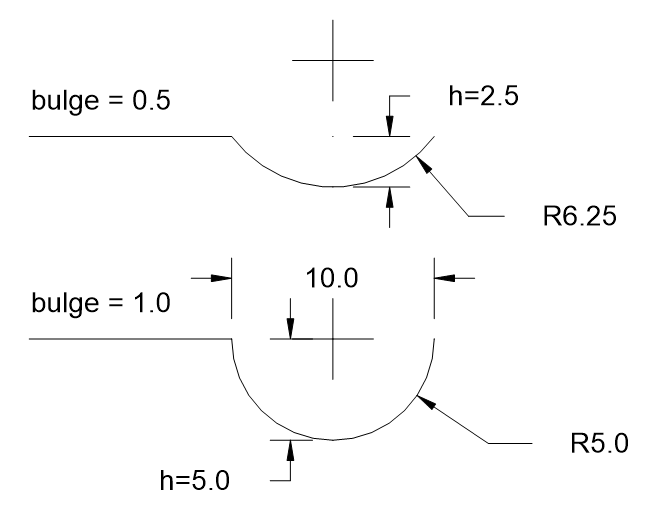LWPolyline¶
The LWPOLYLINE entity (Lightweight POLYLINE, DXF Reference) is defined as
a single graphic entity, which differs from the old-style Polyline
entity, which is defined as a group of sub-entities. LWPolyline
display faster (in AutoCAD) and consume less disk space, it is a planar
element, therefore all points are located in the OCS as (x, y)-tuples
(LWPolyline.dxf.elevation is the z-axis value).
Subclass of |
|
DXF type |
|
factory function |
|
Inherited DXF attributes |
|
Required DXF version |
DXF R2000 ( |
Bulge value
The bulge value is used to create arc shaped line segments for Polyline
and LWPolyline entities. The arc starts at the vertex which includes
the bulge value and ends at the following vertex. The bulge value defines the
ratio of the arc sagitta (versine) to half line segment length, a bulge value
of 1 defines a semicircle.
The sign of the bulge value defines the side of the bulge:
positive value (> 0): bulge is right of line (counter clockwise)
negative value (< 0): bulge is left of line (clockwise)
0 = no bulge

Start- and end width
The start width and end width values defines the width in drawing units for the following line segment. To use the default width value for a line segment set value to 0.
Width and bulge values at last point
The width and bulge values of the last point has only a meaning if the polyline is closed, and they apply to the last line segment from the last to the first point.
See also
User Defined Point Format Codes¶
Code
Point Component
x
x-coordinate
y
y-coordinate
s
start width
e
end width
b
bulge value
v
(x, y [, z]) as tuple
- class ezdxf.entities.LWPolyline¶
-
- dxf.flags¶
Constants defined in
ezdxf.lldxf.const:dxf.flags
Value
Description
LWPOLYLINE_CLOSED
1
polyline is closed
LWPOLYLINE_PLINEGEN
128
linetype is generated across the points
- dxf.const_width¶
Constant line width (float), default value is 0.
- dxf.count¶
Count of polyline points (read only), same as
len(polyline)
- property closed: bool¶
Get/set closed state of polyline. A closed polyline has a connection segment from the last vertex to the first vertex.
- property has_arc: bool¶
Returns
Trueif LWPOLYLINE has an arc segment.
- property has_width: bool¶
Returns
Trueif LWPOLYLINE has any segment with width attributes or the DXF attribute const_width is not 0.
- __len__() int¶
Returns count of polyline points.
- __getitem__(index: int) Tuple[float, float, float, float, float]¶
Returns point at position index as (x, y, start_width, end_width, bulge) tuple. start_width, end_width and bulge is 0 if not present, supports extended slicing. Point format is fixed as “xyseb”.
All coordinates in OCS.
- __setitem__(index: int, value: Sequence[float]) None¶
Set point at position index as (x, y, [start_width, [end_width, [bulge]]]) tuple. If start_width or end_width is 0 or left off the default width value is used. If the bulge value is left off, bulge is 0 by default (straight line). Does NOT support extend slicing. Point format is fixed as “xyseb”.
All coordinates in OCS.
- Parameters:
index – point index
value – point value as (x, y, [start_width, [end_width, [bulge]]]) tuple
- __delitem__(index: int) None¶
Delete point at position index, supports extended slicing.
- __iter__() Iterator[Tuple[float, float, float, float, float]]¶
Returns iterable of tuples (x, y, start_width, end_width, bulge).
- vertices() Iterator[tuple[float, float]]¶
Returns iterable of all polyline points as (x, y) tuples in OCS (
dxf.elevationis the z-axis value).
- append(point: Sequence[float], format: str = DEFAULT_FORMAT) None¶
Append point to polyline, format specifies a user defined point format.
All coordinates in OCS.
- Parameters:
point – (x, y, [start_width, [end_width, [bulge]]]) tuple
format – format string, default is “xyseb”, see: format codes
- append_points(points: Iterable[Sequence[float]], format: str = DEFAULT_FORMAT) None¶
Append new points to polyline, format specifies a user defined point format.
All coordinates in OCS.
- Parameters:
points – iterable of point, point is (x, y, [start_width, [end_width, [bulge]]]) tuple
format – format string, default is “xyseb”, see: format codes
- insert(pos: int, point: Sequence[float], format: str = DEFAULT_FORMAT) None¶
Insert new point in front of positions pos, format specifies a user defined point format.
All coordinates in OCS.
- Parameters:
pos – insert position
point – point data
format – format string, default is “xyseb”, see: format codes
- clear() None¶
Remove all points.
- get_points(format: str = DEFAULT_FORMAT) list[Sequence[float]]¶
Returns all points as list of tuples, format specifies a user defined point format.
All points in OCS as (x, y) tuples (
dxf.elevationis the z-axis value).- Parameters:
format – format string, default is “xyseb”, see format codes
- set_points(points: Iterable[Sequence[float]], format: str = DEFAULT_FORMAT) None¶
Remove all points and append new points.
All coordinates in OCS.
- Parameters:
points – iterable of point, point is (x, y, [start_width, [end_width, [bulge]]]) tuple
format – format string, default is “xyseb”, see format codes
- points(format: str = DEFAULT_FORMAT) Iterator[list[Sequence[float]]]¶
Context manager for polyline points. Returns a standard Python list of points, according to the format string.
All coordinates in OCS.
- Parameters:
format – format string, see format codes
- transform(m: Matrix44) LWPolyline¶
Transform the LWPOLYLINE entity by transformation matrix m inplace.
A non-uniform scaling is not supported if the entity contains circular arc segments (bulges).
- Parameters:
m – transformation
Matrix44- Raises:
NonUniformScalingError – for non-uniform scaling of entity containing circular arc segments (bulges)
- virtual_entities() Iterator[Line | Arc]¶
Yields the graphical representation of LWPOLYLINE as virtual DXF primitives (LINE or ARC).
These virtual entities are located at the original location, but are not stored in the entity database, have no handle and are not assigned to any layout.
- explode(target_layout: BaseLayout | None = None) EntityQuery¶
Explode the LWPOLYLINE entity as DXF primitives (LINE or ARC) into the target layout, if the target layout is
None, the target layout is the layout of the source entity. This method destroys the source entity.Returns an
EntityQuerycontainer referencing all DXF primitives.- Parameters:
target_layout – target layout for the DXF primitives,
Nonefor same layout as the source entity.